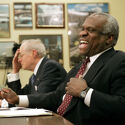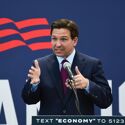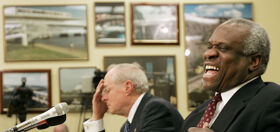Presidential candidate Barack Obama‘s campaign just sent over a link to the complete list of John Edwards-loving gays who now support Obama.
Complete List of Edwards’ Gay Obama Supporters
Help make sure LGBTQ+ stories are being told...
We can't rely on mainstream media to tell our stories. That's why we don't lock Queerty articles behind a paywall. Will you support our mission with a contribution today?
Cancel anytime · Proudly LGBTQ+ owned and operated



















seitan-on-a-stick
Two for Two, New York! Vote Hil-yeah on Super Tuesday, February 5th.
NYTimes Editorial
Primary Choices: Hillary Clinton
“This generally is the stage of a campaign when Democrats have to work hard to get excited about whichever candidate seems most likely to outlast an uninspiring pack. That is not remotely the case this year.
The early primaries produced two powerful main contenders: Hillary Clinton, the brilliant if at times harsh-sounding senator from New York; and Barack Obama, the incandescent if still undefined senator from Illinois. The remaining long shot, John Edwards, has enlivened the race with his own brand of raw populism.
As Democrats look ahead to the primaries in the biggest states on Feb. 5, The Times’s editorial board strongly recommends that they select Hillary Clinton as their nominee for the 2008 presidential election.
We have enjoyed hearing Mr. Edwards’s fiery oratory, but we cannot support his candidacy. The former senator from North Carolina has repudiated so many of his earlier positions, so many of his Senate votes, that we’re not sure where he stands. We certainly don’t buy the notion that he can hold back the tide of globalization.
By choosing Mrs. Clinton, we are not denying Mr. Obama’s appeal or his gifts. The idea of the first African-American nominee of a major party also is exhilarating, and so is the prospect of the first woman nominee. “Firstness†is not a reason to choose. The times that false choice has been raised, more often by Mrs. Clinton, have tarnished the campaign.
Mr. Obama and Mrs. Clinton would both help restore America’s global image, to which President Bush has done so much grievous harm. They are committed to changing America’s role in the world, not just its image.
On the major issues, there is no real gulf separating the two. They promise an end to the war in Iraq, more equitable taxation, more effective government spending, more concern for social issues, a restoration of civil liberties and an end to the politics of division of George W. Bush and Karl Rove.
Mr. Obama has built an exciting campaign around the notion of change, but holds no monopoly on ideas that would repair the governing of America. Mrs. Clinton sometimes overstates the importance of résumé. Hearing her talk about the presidency, her policies and answers for America’s big problems, we are hugely impressed by the depth of her knowledge, by the force of her intellect and by the breadth of, yes, her experience.
It is unfair, especially after seven years of Mr. Bush’s inept leadership, but any Democrat will face tougher questioning about his or her fitness to be commander in chief. Mrs. Clinton has more than cleared that bar, using her years in the Senate well to immerse herself in national security issues, and has won the respect of world leaders and many in the American military. She would be a strong commander in chief.
Domestically, Mrs. Clinton has tackled complex policy issues, sometimes failing. She has shown a willingness to learn and change. Her current proposals on health insurance reflect a clear shift from her first, famously disastrous foray into the issue. She has learned that powerful interests cannot simply be left out of the meetings. She understands that all Americans must be covered — but must be allowed to choose their coverage, including keeping their current plans. Mr. Obama may also be capable of tackling such issues, but we have not yet seen it. Voters have to judge candidates not just on the promise they hold, but also on the here and now.
The sense of possibility, of a generational shift, rouses Mr. Obama’s audiences and not just through rhetorical flourishes. He shows voters that he understands how much they hunger for a break with the Bush years, for leadership and vision and true bipartisanship. We hunger for that, too. But we need more specifics to go with his amorphous promise of a new governing majority, a clearer sense of how he would govern.
The potential upside of a great Obama presidency is enticing, but this country faces huge problems, and will no doubt be facing more that we can’t foresee. The next president needs to start immediately on challenges that will require concrete solutions, resolve, and the ability to make government work. Mrs. Clinton is more qualified, right now, to be president.
We opposed President Bush’s decision to invade Iraq and we disagree with Mrs. Clinton’s vote for the resolution on the use of force. That’s not the issue now; it is how the war will be ended. Mrs. Clinton seems not only more aware than Mr. Obama of the consequences of withdrawal, but is already thinking through the diplomatic and military steps that will be required to contain Iraq’s chaos after American troops leave.
On domestic policy, both candidates would turn the government onto roughly the same course — shifting resources to help low-income and middle-class Americans, and broadening health coverage dramatically. Mrs. Clinton also has good ideas about fixing the dysfunction in Mr. Bush’s No Child Left Behind education program.
Mr. Obama talks more about the damage Mr. Bush has done to civil liberties, the rule of law and the balance of powers. Mrs. Clinton is equally dedicated to those issues, and more prepared for the Herculean task of figuring out exactly where, how and how often the government’s powers have been misused — and what must now be done to set things right.
As strongly as we back her candidacy, we urge Mrs. Clinton to take the lead in changing the tone of the campaign. It is not good for the country, the Democratic Party or for Mrs. Clinton, who is often tagged as divisive, in part because of bitter feeling about her husband’s administration and the so-called permanent campaign. (Indeed, Bill Clinton’s overheated comments are feeding those resentments, and could do long-term damage to her candidacy if he continues this way.)
We know that she is capable of both uniting and leading. We saw her going town by town through New York in 2000, including places where Clinton-bashing was a popular sport. She won over skeptical voters and then delivered on her promises and handily won re-election in 2006.
Mrs. Clinton must now do the same job with a broad range of America’s voters. She will have to let Americans see her power to listen and lead, but she won’t be able to do it town by town.
When we endorsed Mrs. Clinton in 2006, we were certain she would continue to be a great senator, but since her higher ambitions were evident, we wondered if she could present herself as a leader to the nation.
Her ideas, her comeback in New Hampshire and strong showing in Nevada, her new openness to explaining herself and not just her programs, and her abiding, powerful intellect show she is fully capable of doing just that. She is the best choice for the Democratic Party as it tries to regain the White House.”
January 25th, 2008
seitan-on-a-stick
GayCityNews:
Hillary Offers Ideas and Solutions
By: TROY MASTERS
01/31/2008
“It seems like a dream moment in American politics. We appear poised to make history by electing a woman, or an African-American man, to run the world’s most powerful nation. But, in this dream, there is a distracting battle over identity politics, and who is most clever in using them to obliterate their opponent.
At first, both Clinton and Obama unwittingly exploited identity politics. A Clinton presidency wouldn’t be a victory for just her, but would represent a giant leap toward equality for all. An Obama presidency would break down a huge barrier, and advance equality for people of color in general.
Although we’ve witnessed identity politics in a presidential election before, it has never been at such a cellular level of identity. Race and gender are not invisible. In that way, they are profoundly different than being identified as Catholic, or Irish, or from the South, or from a particular class, or even gay.
But this is not a contest over which minority is most deserving of the presidency, however much I may yearn for the inevitable social impact created by the election of either candidate.
Having sold the American public on the wrong-headed notion that there is little political difference between Clinton and Obama, the media have focused on more explosive and innuendo-laden angles involving race and gender.
Clinton voted as senator to support President George W. Bush’s invasion of Iraq. Obama, who was not a US senator at the time of the vote, waged a campaign against the war. The fact that he did not have to face the political realities of the Senate theater at the time the war was given the green light is a buried story. Clinton has been pummeled for her vote. Later, a consistent Clinton and a conflicted Obama – now bowing to the realities of actually being a member of the Senate – both voted to extend the Patriot Act, and to continue funding the war.
Both Clinton and Obama support some measure of equality for the LGBT community. Both fall short of supporting gay marriage, but they do endorse civil unions.
Clinton supports a trans-inclusive ENDA. She has raised money for LGBT organizations. She protected local AIDS programs from a Bush administration reallocation of funds that would have hobbled or closed vital programs statewide and in other urban areas where, like New York City, the epidemic first raged.
Obama’s Senate record on gay rights is similar and he mentions gays on the campaign trail more often than Hillary. But he also gives his mega-phone over to the “ex-gay” movement in an attempt to draw support from conservative African-American voters.
Selecting a President to channel Martin Luther King or JFK or FDR is not enough; we need a leader and a doer, not a dreamer. It is fantasy to believe that Obama will usher in an era of bipartisan cooperation and strife-free government.
Obama’s race will not automatically facilitate this any more than Hillary’s gender will. Obama’s pretty platitudes about “hope” and “change” enable him to avoid addressing the ugly problems and the even uglier solutions. It’s so beautiful one can easily fail to miss there is a complete lack of policy thought.
Charging racism is an easy way to distract almost any critique or conversation. It’s impossible to shirk off, dismiss or dispute. That charge has too often been leveled – even at imagined slights and arguable offense – by many who support Obama’s candidacy.
Obama’s campaign also shows a troubling pattern of capitalizing on the same tiresome, gender-discriminating, Hillary-hating language the Republicans have used for years. Obama points to Bill Clinton’s reflection on the history of the African American vote in South Carolina as “troublesome.” Clever, even if true, as he manages to play both race and gender in one fell swoop, charging that the “little lady’s” husband is race-baiting.
When the gender card is played, portraying Clinton as a woman whose surrogates fight for her reinforces the stereotype of women being weaker, while fighting deems her too aggressive, an unattractive ball-buster. Add to that the implication that Hillary can’t even control her man. Not fighting is impossible, of course. It paralyzes.
While Hillary may occasionally bore with detail, she is praised – even by Obama’s supporters – for her well thought-out solutions for the concrete problems she identifies. This is an extraordinary and powerful distinction that makes her more deserving of the job.
So allow me some pretty platitudes about Hillary Clinton.
She will bring about change through substantive action. She can stand up to and be victorious against almost any line of attack, as she has shown us time and again. She understands the benefit of reflection before reflex. She has shown she can engage her enemies and gain their cooperation, if not their trust. She will bring about hope because she will deliver on her essential promises. Indeed, Hillary has perhaps the widest worldview of any candidate to ever come before the American people seeking the presidency.
A Hillary presidency will also change the world.”
Troy Masters is the founding associate publisher of Gay City News.
http://www.GayCityNews.com
allstarecho
American Apparel is supporting Obama.. their web site, urges people to support him or McCain and explains, “Why? Because of their honesty on the issue of immigration, the most significant civil rights concern the country has faced in
50 years.”
I’m sorry, us gay folk and our civil rights concern must be new.
hannah friedman
My humble musical letter to President Obama:
http://www.youtube.com/watch?v=f4bZw9FmXZ4
Best,
Hannah Friedman